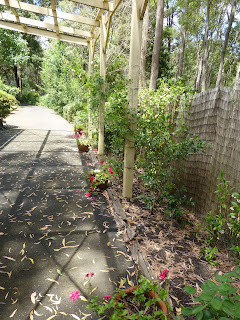A
Multi-Cultural Xmas Lunch
History
of the Group
Takis and I have just met up with a group of friends
from Emerald. These are folk we’ve known for the last four years and though we
might bump into each other in the village and perhaps we go to the same functions
we make a habit of meeting up at least four times a year. It all began because on of the friends
we met when we first moved to this Australian village expressed sadness that
she no longer met with her old friends for a good discussion as most had moved
away from this area. I suggested we start up a new group and we decided to
include a few people that we both knew. And as for a ‘good discussion’ we would
only allow talk about those aspects of life polite society banned, sex,
religion and politics!
Various
Cultural Backgrounds
The core of this group is only seven in number and we
try to add a new couple at each get-together to add spice and freshness to the
debates. But really we hardly need any newcomers as those seven represent such
varied backgrounds. Though we are all Australians we are all immigrants. None
of us was born in Australia; four came in their twenties and two when only
young children.
One comes from Malta, one from Venice, Italy, one from Spain.
One was born in China of English and Russian parents, another was born in Egypt
of Greek parents, and two of us are from England. But we have all been here
long enough to speak English well (even though some still have very strong
accents) and most of us have done some schooling in this country.
Conversations
and Arguments
As you can imagine, with TV, aches and pains, family
matters all banned subjects, the conversations can be very lively. We may all
be considered ‘lefties’ but do not always agree with Labor politics, and
certain we have different views about the actions of our current Liberal
government. You might be shocked at the vehemence of some of the opinions
expressed, and refuted.
Once I thought two of the men would come to blows. But
after strong discussion, because we are friends and do not really take offence
we often find that disagreements are more about how the idea was expressed,
rather than the idea behind that expression, and the argument often collapses
into laughter or into an agreement that there might have to be a compromise.
Menu for This Christmas
This Sunday was our last meeting for 2015 and it only included the basic six and was at our house. I had suggested each family bring along food that was celebratory, and perhaps something they served for Christmas.
The menu included: champagne, a small platter of handmade gnocchi for starters, roast pork and roast vegetables for mains, and a tropical fruit salad, a chocolate cake and macaroons for dessert.
We meet in each other’s homes. And really with the
sort of spread laid on we could not afford the place that would offer us that
kind of glorious food, or a padded room to ourselves where we can shout
ourselves hoarse.
It was great fun, as usual, but what I really want to tell you about this lunch is that it was a time when we shared, and we argued. This is what can be
great about multiculturalism.
We were willing to share. I asked them all to bring
along a quote, joke, a poem, a personal story about Christmas. Some of the
jokes we did not all ‘get’ as humour does not always readily cross cultural
lines. But stories of personal experience we all sympathised with.
And we were also willing to accept ‘New Australian
Xmas Traditions’, (cards, trees,
xmas pud., etc.) even though not all of us had these memories, in fact for some in
their places of origin Christmas was not a big celebration and New Year and
Easter were more celebrated.
And we were willing to disagree. Some of our arguments
were about how the new government in Australia was doing, how best to integrate
‘Anglos’ and ‘Aboriginals’, and whether the ‘West’ had brought the ‘Muslim
Problem’ on themselves.
While newcomers often want to share something special
about their culture often they are not willing to take the next step in integration, that of expressing an idea even if the
other person disagrees. And then not just listening to the disagreement but being willing to try
and explain the idea in words the other might better understand. And, not only
explaining, willing to take on the chin the laughter that might ensue, about
something that still sounds strange to the other.
And then, even further, being willing to shake hands and agree that, as you want to
live in a multicultural society, you can live with different ideas.




























































